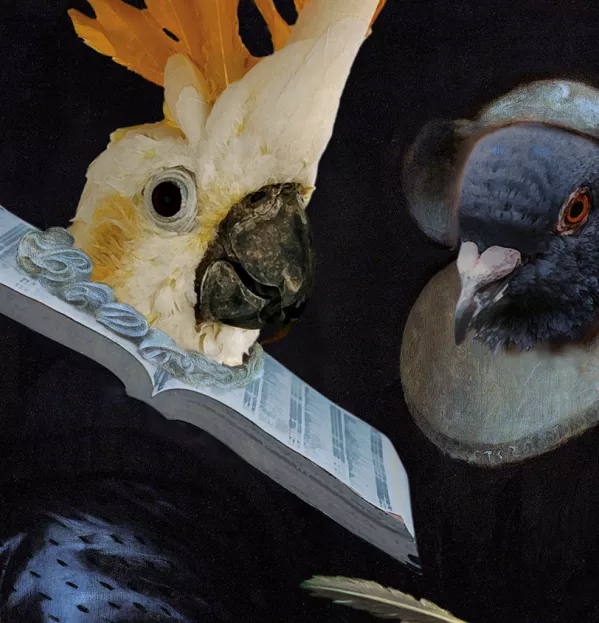
A dictionary is a hard thing to swallow

Vocabulary is big at the moment. Or should I say vast, enormous, monumental, gargantuan.
If you believe the hype - formed from a plethora of reports, books and research papers - then word knowledge is the biggest problem our students face. Work on developing vocabulary with our pupils, it is claimed, and a world of learning will miraculously open up.
But is this really the case? Is the “gap” something we should have right at the top of the learning agenda? And is vocabulary the answer to everything?
And what if this obsession with vocabulary was itself the cause of unintended problems - creating a bulge in verbosity rather than a narrowing gap in word knowledge?
Vocabulary is, of course, important. Having a rich word store is a major aspect of being able to read widely and with good, deep understanding. It is also vital for both talk and writing, allowing pupils to express their thoughts with precision and sophistication.

And in subject learning, the terms of the discipline are ones that students need to learn. Subject teachers need to consider the ways in which students might require support in absorbing these sometimes challenging words, to apply them with confidence and accuracy, in their reading and their own writing.
What I take issue with is not the idea that vocabulary is important, but rather with four ideas that have been emerging in recent years.
The first is that vocabulary is of pre-eminent importance in the reading process and requires the whole reading curriculum to be structured around it.
Second is that vocabulary is best taught by teaching vocabulary.
Third is the idea that focusing a lot of attention on “academic” vocabulary will lead to significantly better reading and writing.
Finally, there is a fundamental question to be asked about whether there actually is incontrovertible evidence of a huge and growing vocabulary gap among young people.
Let’s take each of these points in turn.
1. Vocabulary should not be the main focus of reading instruction
Reading is a complex and multifaceted activity. It involves not only word knowledge, but also generic and discourse-level understanding, reading stamina and the ability to cope with complex syntax. It involves making judgements about what is significant and what is of peripheral importance. It engages both thoughts and feelings, and readers often experience fluctuating levels of attention to detail (indeed, sometimes attention of any kind), depending on what they are reading and how the text is written.
We all read slowly and meticulously in some circumstances, poring over every word, and fast and furious in others, just whizzing through to get the gist. I read my newspaper each day in all of these different ways. I read novels in all of these ways, too, but I read the work of my colleagues, or a book on vocabulary by the academic ED Hirsch or teacher Alex Quigley, with much closer scrutiny.
So vocabulary is important, yes, but it’s just one of a complex web of aspects of language, all of which need to be developed and taught.
For example, when we look at the work of linguists such as Katherine Pereira, who examined the difficulties faced by pupils reading subject textbooks and non-fiction texts, we discover that the main focus of her attention is not vocabulary, but sentence length and syntax.
In particular, complex syntax seems to her to be the overriding difficulty presented to inexperienced readers, for whom it is not always apparent what is the key element in the sentence and what is the more minor part in which exemplification or expansion of ideas might occur.
2. Teaching wordlists is not the best way to teach vocabulary
If we agree that vocabulary is one of the many elements in reading and writing, is teaching vocabulary the best way of learning new words? I would acknowledge that there is a place for some explicit teaching and I believe that the new “vocabularians” - I think that’s a coinage (or neologism) of my own - would agree that teaching lists of words will inevitably take you only so far.
The Oxford University Press’s (OUP) webpage on its report “Why Closing the Word Gap Matters”, has as one of its three take-away ideas that conversations and wider reading in the classroom and at home are of vital importance. Of all the ways of developing one’s word store, reading is the most significant. Students at secondary level should not only be reading fiction, but also reading in their subject disciplines; they should be encountering articles from newspapers or journals that present the subject for non-specialist audiences, reading popular science or geography or history.
They should see how historians do history - not only the words they use, but also the genres in which they write and the ways in which they structure their ideas; in other words, the discourse of the subject.
3. Focusing on vocabulary above all else can detract from bigger aims
Is the current focus on vocabulary not only in danger of offering an impoverished picture of the act of reading, but also risking a watering-down of the intellectual requirements and challenges of a rich curriculum?
When vocabulary is so strongly foregrounded, other aspects of learning can be pushed into the background. It is as if learning words is a “proxy” for education - this is something that Quigley himself says in his book, Closing the Vocabulary Gap, using the term “proxy” as though it’s a positive thing.
But what is lost in this is something rather fundamental about education being all about developing important ideas and understandings, with vocabulary as the means of expression or means of access to those ideas rather than a “good” for its own sake.
What this risks is students being taught a lot of academic-sounding words and being led to believe that “sounding academic” is what education is all about, rather than grappling with ideas that constitute the cornerstones of subject disciplines. Of course, developing a rich vocabulary allows you to express your ideas cogently, but the ideas are what matters.
A good example of this in my own subject, English, is a word such as “metaphor”. It is all well and good knowing that a metaphor is a way of comparing one thing with another, of saying something “is” something else in order to give insights into the original thing you are describing, or even to know the etymology of the word. But that’s the easy part; that knowledge can be taught and reinforced through many repeated, very short experiences of a teacher using the word and identifying metaphors in all the texts that students encounter.
The really difficult part is not pinning the label to the thing, or even remembering the label - it is exploring how it is used, what impact it has, whether it is a significant feature or just a small decorative flourish, whether it is being used in ways that are conventional, clichéd or subversive. That is what takes time - time for significant conversations about thoughts and ideas, for which the correct vocabulary is not foregrounded, but rather assumed, to allow underlying ideas to flourish.
The same is true, I’m sure, in other subjects, where concepts (and the words in which they are expressed) accumulate meaning over time, in discussion and exploration, and through reading them in multiple contexts.
The fear of what an obsession with vocabulary can cause is not just a theoretical one. In my work I read a lot of student writing and have begun to see a developing trend of overuse of terminology, academese and elaborate vocabulary just for the sake of it; often it is with very little of the confidence that comes from having lived and experienced it in real books, in broad reading and in authentic experiences of hearing it used in classrooms, in natural but serious and intellectually challenging conversations and unstilted forms.
The students coming up from GCSE into A level who have good ideas and express them with clarity, simplicity and an appropriate use of terminology are becoming increasingly rare.

Why is this? Well, the consistency of the pattern suggests that teachers must be telling them that academic signposting, such as “thus” or “furthermore”, is a good thing, suggesting also that “utilise” is more impressive than “use” or “in consequence” is better than “so”. They must have got the message somewhere that peppering your writing with barely understood Latinate terms is better than saying something you really think with directness and clarity. They must think that the language you use to express something is more important than the thing you are expressing.
Students who read lots of really good criticism in the subject - which is often surprisingly spare in its use of specialist terminology - who develop their vocabulary in context through broad reading of literature, and who have sophisticated conversations with each other in class, as well as with their teacher, will be more likely to use academic vocabulary naturally and appropriately.
4. The research on word gaps is not as conclusive as presented
Finally, to the question of a vocabulary gap. How bad is the vocabulary of our current cohort of students? The OUP report would have us believe that things are in steep decline. The short pieces written by eminent educationalists as part of the report are generally very worthwhile and sensible, dealing with teaching issues rather than the question of the size of the gap. I have little complaint with any of these. But it is in the statistics presented in the research itself that the real problem seems to lie.
The data is based entirely on teachers’ opinions. Important though it is to know what teachers think, it does not give us a definitive answer as to whether there have been actual changes over time to the number of words or kinds of words that students know.
Although there are several research references in the report on the question of language and attainment, most focus on the much broader idea of “language development” rather than “vocabulary deficiency”.
The only piece of vocabulary-gap research that is quoted beyond this current survey is the Hart and Risley “30-million word gap” research of 1995. This work was based on just 42 families in Kansas, following children from seven months to three years old. It has been comprehensively critiqued, in terms of its research methodology, yet, as in this report, it has been used extensively as research evidence in discussions of the teaching of pedagogy, not just in early years education, but for secondary-age students too, for whom the influences on the size and range of their vocabulary extend well beyond the parent-child interactions of this preschool period.
Prior work on the question of language (rather than vocabulary) deficits in the 1970s centred on a key debate between linguists such as Basil Bernstein, and those clustered around Harold Rosen in the UK, as well as Arthur Applebee and others in the US. Bernstein’s notion of restricted and elaborated codes, with working-class children held back by having only “restricted” codes, was fiercely contested by Rosen and others, who focused on the richness of the language all students bring into the classroom.
Their work was underpinned by work in the field of linguistics about repertoires of language and how schools can develop students’ repertoires and range, without having to deny the wealth of language experiences and expertise that students already have in their own lives.
The “vocabulary gap” work seems to play into the idea of “poor” children arriving in school with nothing. A much better way of looking at it might be to recognise the rich and multiple ways in which we communicate ideas, and then think about how we immerse students in rich and varied uses of language, generate their interest in both language and ideas, and make vocabulary a part of that.
In trying to fill a supposed vocabulary “gap”, it would be a great shame if we ended up with verbosity and stilted writing, leaving little room for the real heart of education, which should be thoughts and ideas expressed with elegance and clarity.
Barbara Bleiman is an education writer and specialist in the English secondary curriculum. She also works for the English and Media Centre, and edits emagazine
You need a Tes subscription to read this article
Subscribe now to read this article and get other subscriber-only content:
- Unlimited access to all Tes magazine content
- Exclusive subscriber-only stories
- Award-winning email newsletters
- Unlimited access to all Tes magazine content
- Exclusive subscriber-only stories
- Award-winning email newsletters
You need a subscription to read this article
Subscribe now to read this article and get other subscriber-only content, including:
- Unlimited access to all Tes magazine content
- Exclusive subscriber-only stories
- Award-winning email newsletters
- Unlimited access to all Tes magazine content
- Exclusive subscriber-only stories
- Award-winning email newsletters